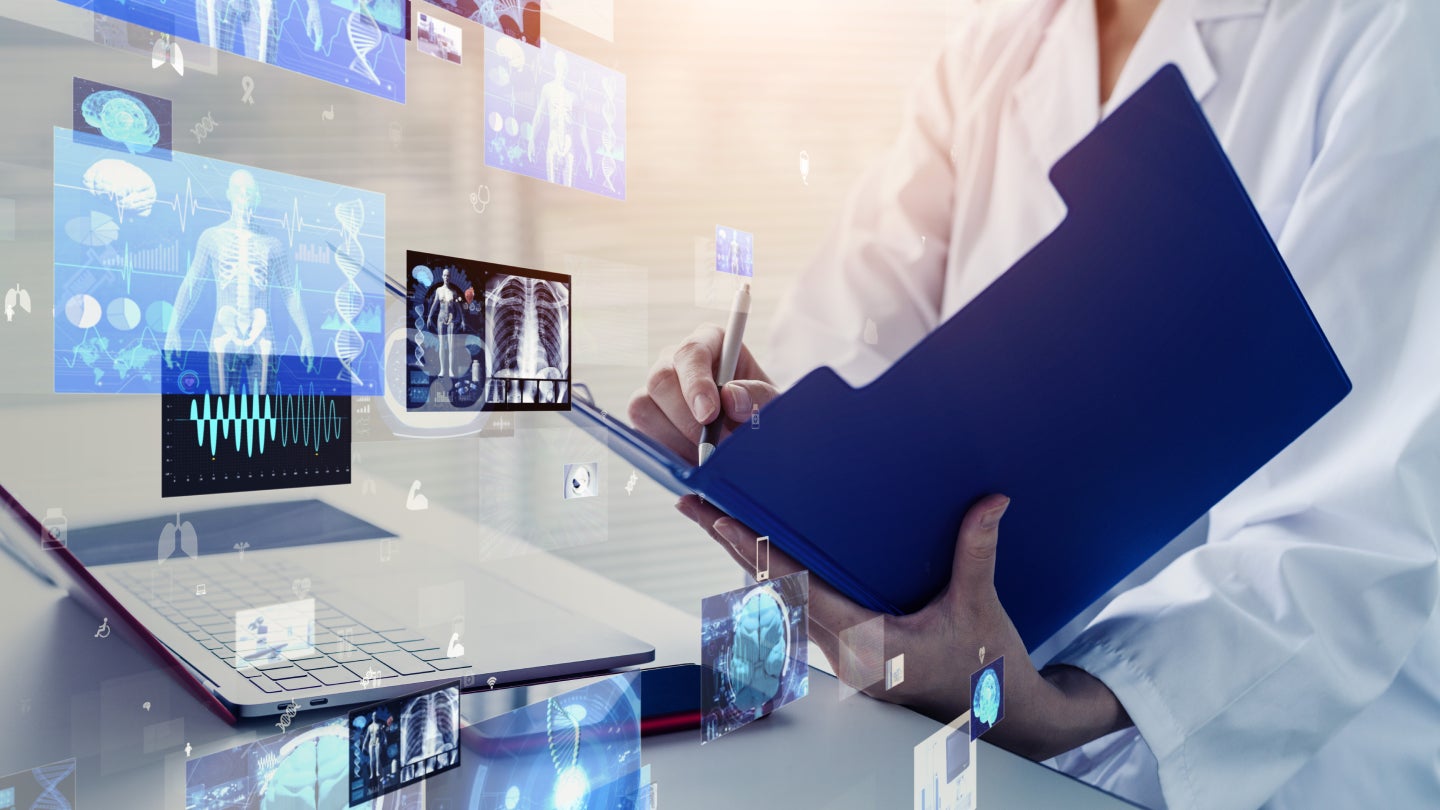
The looming inevitability of artificial intelligence (AI), Data, and the UK’s National Health Service (NHS) all took focus at a fully packed Manchester conference.
Clinical and advisory staff from NHS trusts nationwide, alongside representatives from private and academic bodies gathered at the Hilton Hotel on 7 November for the 2023 National Institute for Health and Care Excellence (NICE) Conference in Manchester.
The major theme running through much of the conference was all about how fast the pace of technology moving through the healthcare sector truly is and how healthcare professionals run the risk of being left behind if practices can’t keep up.
Research published by GlobalData found that the AI market was expected to reach sales of $93bn in 2023, up 12% from 2022, much of it firmly with the medical device space. As a result, it is a market that is rapidly moving into all aspects of healthcare, forcing the hands of national regulators across the world.
With that in mind, much of the conference revolved around NICE’s own frameworks and mechanisms, their successes as well as some of the places they need to advance. But it also covered how individual bodies within the organisation had found their own victories.
Evaluations up
One such victory for NICE was that in 2022/23 the body had a 17% faster turnaround for medicine evaluations compared with previous years.
How well do you really know your competitors?
Access the most comprehensive Company Profiles on the market, powered by GlobalData. Save hours of research. Gain competitive edge.

Thank you!
Your download email will arrive shortly
Not ready to buy yet? Download a free sample
We are confident about the unique quality of our Company Profiles. However, we want you to make the most beneficial decision for your business, so we offer a free sample that you can download by submitting the below form
By GlobalDataIn one of the first talks of the day, NICE chairman Sharmila Nebharjani touted the body’s increasing efficacy, as well as plans to incorporate real-world and AI-generated evidence into medicine evaluation submissions.
At the same time, Jennifer Prescott, NICE programme director of health technology assessment process and operations detailed how NICE had completed 800 appraisals in the 2022/23 period, whilst Nebharjani stated the agency has made significant strides in improving the efficacy of its evaluation protocols.
NICE chief executive Dr Sam Roberts explained how the use of real-world data to supplement a medicine evaluation application has been an increasing trend, as has the need for creating guidelines on AI-generated evidence, which will be a focus for the body in 2024.
AI and Machine Learning Key to the Future
AI and machine learning again took centre stage in a later talk, where it was posited as a means of helping the NHS out of its current administrative difficulties, decreasing administrative workloads and freeing up time for more in-person assessments.
Sticking to the main stage, Sharmila Nebharjani and Sam Roberts argued that the use of machine learning helps in decreasing administrative workload and frees up more time for clinical assessments, but Roberts was keen to underline that human oversight would still be critical.
Machine learning has already found a home in the diagnostic imaging market, which GlobalData predicts to grow to be worth $45bn in 2030, but is expected to work its way into a multitude of areas.
The same talk also saw mention of the use of remote patient monitoring, with virtual wards and therapeutic/diagnostic apps aimed at reducing waiting times and improving access to key services.
A GlobalData report found that the remote patient monitoring market is expected to be worth $760m in 2030, with a spike in value fueled by a mixture of the increased demand for wearable and virtual care delivery technology during the Covid-19 pandemic, as well as the steady growth of remote monitoring technology.
Real-world data for national problems
Later in the day a talk helmed by Janet Valentine of the Association of the British Pharmaceutical Industry (ABPI), detailed how real-world data had been used as part of the NHS’ Galleri trial to improve diversity among patient cohorts.
The executive director for innovation and research policy emphasised how building public trust was going to be key to the use of real-world data, with the UK’s lack of diversity in clinical trials laid at the feet of general public mistrust in the NHS.
Valentine said: “What the NHS has done here is they’ve been able to enrich the patient populations who are usually underrepresented in clinical trials, and they have been very successful in doing so.
“What we can see in the data through enrichment is that the NHS has been able to achieve the diversity they want across age groups and across deprivation, however, less so with ethnicity, and the reason for this is because ethnicity is still poorly recorded in electronic patient records.”
Research by GlobalData in 2021 found that the greatest increase in clinical trials measuring real-world evidence occurred from 2016 to 2019, with the number of studies rising each consecutive year, from 76 trials in 2016 to 162 trials in 2019.
Earlier this year, the Health Research Authority (HRA) published guidance about improving diversity in clinical research, which included a number of steps to improve diversity in clinical trials.
Continuous Glucose Monitoring on the Rise
Away from the main stage and in the side rooms, a number of regional and local health bodies met to present data on initiatives that are carried out using NICE’s frameworks, ranging across UK NHS trust from Manchester to Peterborough.
Among the presentations, chief pharmacist for Peterborough and Cambridgeshire, Kelly Broad, touted how the trust had been able to get as many as 97% of children in the trust, identified to have type-1 diabetes, on continuous glucose monitoring technology (CGM).
Previously the trust had found in April of 2022 that 32% of children and 61% of type-1 adults were similarly not using CGM technology to keep up with their condition.
Working with the charity Diabetes UK, the trust worked through a number of obstacles including the limited choice in affordable CGM devices, putting together a total cost for the project that totalled £2.2m, which the local trust unanimously accepted.
Broad detailed how implementing the system would result in 559 fewer ambulance call-outs across the trust as well as show that by the 3rd year of the project, the initiative would even begin to see a return on its investment.
Broad said: “As of August 2023 97% of children with type-1 diabetes now use real-time CGM. We are extremely proud of that. We have got a long way to go, but at the moment we are really positive.”
According to GlobalData’s analysis, the global CGM and insulin pumps market was valued at $10.6 billion in 2022. The market is expected to almost double to $20.8 billion in 2033.
The conference comes shortly before one of the UK’s biggest suppliers of CGM devices, DexCom, managed to fend off a case brought before the UK High Courts by Abbott, that could have seen its devices pulled from sale across the country.
Parting words
The conference was closed out with a roundtable discussion that saw a panel of four positing on the future of NICE amid an uncertain future with the inevitability of AI, for better or worse, in a discussion titled “Hybrid Futures.”
The panel featured Partha Kar, a national speciality advisor on diabetes for NHS England, David Robertson of the School of Informatics at Edinburgh University, AI professor at Oxford University Christopher Yau as well as the return of Sam Roberts.
Yau said: “What is really exciting about AI at the moment is just what we can do with it. Just within my research group alone, we have people working on things like health records or trying to predict long-term health outcomes. What’s also exciting is that AI can be used as an assistive technology that can be used alongside other methods, but it can also be embedded into the production of therapeutics itself
“No human being has ever manually assembled a genome on their own. It has always been done using computer science or in recent years more and more adaptive algorithms.”
The panel determined that whilst the potential benefits of the future use of AI were exciting, there was still a lot of work to be done in terms of ensuring that its rollout is both ethical and effective, ensuring that in order for it to be used appropriately there must be responsible humans at the helm.
David Robertson added: “It’s not hard to build an effective AI, that the industry can do for you. What is hard is building a safe and effective AI that is therapeutically significant.”







